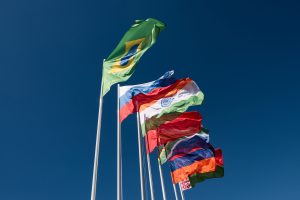Thailand’s government has announced that it will apply to join the BRICS bloc of emerging nations soon, in a bid to fortify its slackening economy and boost its global presence.
The announcement was made after a cabinet meeting on Tuesday, which approved the government’s plans to apply officially for BRICS membership. If approved, Thailand would become the group’s first member from Southeast Asia.
According to the Bangkok Post, government spokesman Chai Wacharonke said the cabinet approved a draft of the official letter indicating Thailand’s intention to become a member of the group.
The BRICS group, named after its core members – Brazil, Russia, India, China, and South Africa – has recently undergone a round of expansion, admitting Saudi Arabia, Iran, Ethiopia, Egypt, and the United Arab Emirates (UAE) in 2024. (Argentina was also among the new members, before its new president, Javier Milei, withdrew the country from the bloc late last year.) Thailand is among 15 countries being considered for the next round of admission, which also includes regional neighbors Vietnam and Indonesia.
According to Chai, Thailand’s letter said that BRICS membership would “benefit Thailand in many dimensions, including enhancing the country’s role in the international arena and increasing its opportunities to co-create a new world order,” in the Bangkok Post’s paraphrase. It added that the country’s vision “is in line with the BRICS principles.”
The spokesperson added that BRICS has invited countries wishing to join to attend the 16th summit of the association, which will be held from October 22-24 in the Russian city of Kazan.
While Thailand’s interest in BRICS dates back quite some time, the membership bid is consistent with Prime Minister Srettha Thavisin’s goal of strengthening the Thai economy and increasing the country’s international profile, which withered during the years of direct and indirect military rule after the 2014 coup.
Many observers, in both the West and the Global South, have expressed skepticism about BRICS’ potential, given its diffuse institutional nature and the very different motivations that its members have for joining the bloc. As the United States Institute for Peace put it after the latest admission of members, “The enlarged BRICS will undoubtedly serve as an important forum for global conversations among middle-income countries, but that may be its biggest impact on global affairs.” It added, “After over a decade in existence, it remains to be seen whether BRICS will become a force politically and economically within the international system.”
Nonetheless, the Thai government probably figures that there is no harm in being involved in any grouping that could potentially help enhance its global economic and political standing. Finance Minister Thirachai Phuvanatnaranubala said last year that BRICS membership was an important way for Thailand to adjust to the shifting global balance of power. “Thailand must adjust its foreign relations strategy, lessening dependence on the USA but being cautious to avoid problems with the long-standing U.S. relationship,” The Nation paraphrased him as saying.
Interestingly, Thailand has also begun the lengthy process of becoming a member of the Organization for Economic Co-operation and Development (OECD), a group of developed countries that is exactly the sort of institution to which BRICS views itself as an alternative. Thailand recently submitted a letter of intent expressing its commitment to join the bloc to the OECD secretary-general, but the approval process is lengthier than that of BRICS.
Membership in these two competing geo-economic blocs would be consistent not only with the Srettha administration’s economic policy agenda; it would also be consistent with the country’s desire to position itself between the contending superpower blocs: particularly, between its long-time security ally, the United States, and its main economic partner, China. Whether Thailand will succeed in becoming a member of both blocs – the OECD membership process is particularly protracted – remains unclear. But its intention to join both, and its belief that it can, is as good an illustration as any of Thailand’s ductile foreign policy in action.

































